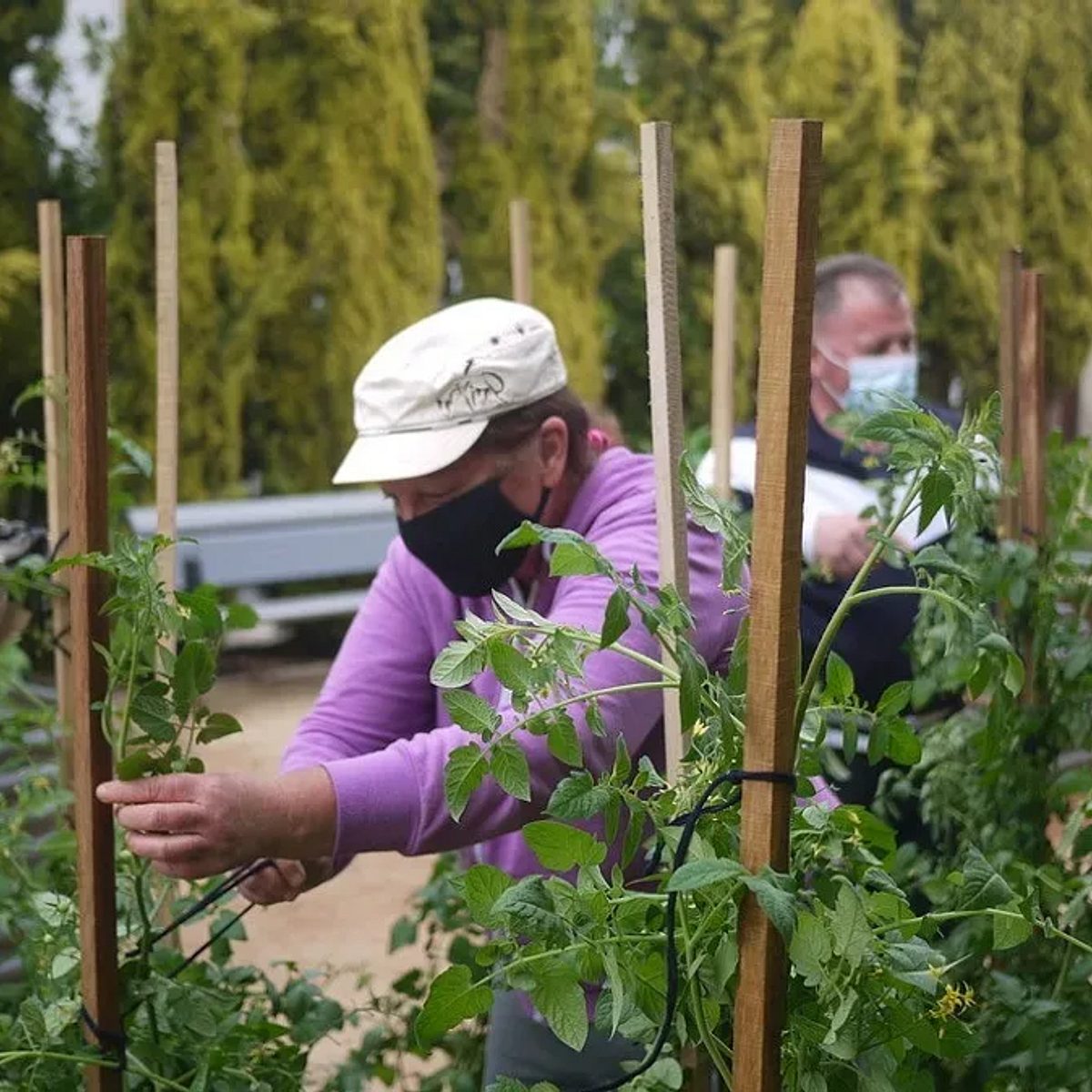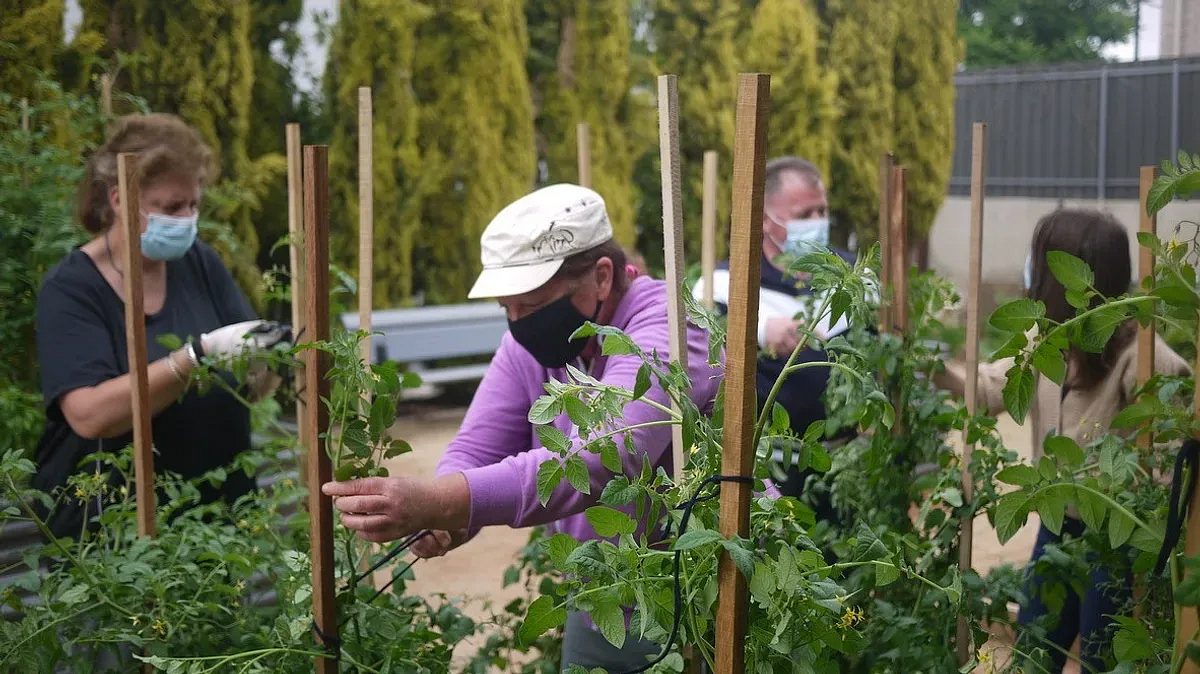

Gardening can be a balm for the soul. Purposeful activities such as sowing, weeding and harvesting can ground us to the present, while we may also experience feelings of satisfaction, calm and hope for what’s to come. Not to mention it gives us a bit of a physical work out!
A connection to plants through other pursuits can provide enormous benefits too; simply using your senses to observe your natural surroundings can be therapeutic, as can creating botanical teas or salves from plants, and crafting artistic plant-based projects.
With the long-known benefits of the botanical world in mind, we have been delighted to employ our own Horticulture Therapist, Emma Lewellyn, who has been working at the Botanic Gardens of South Australia since 2021 to deliver three impactful programs to vulnerable members of our community.
Emma has designed the programs at a time of historical global change, when well-being has become a primary focus and a surge of interest in gardening activities and green spaces has unfolded.
The Therapeutic Horticulture Program is supported by Program Partners ECH - Independent Aged Care.
The Global Garden is a well-being initiative for new migrant communities. Participants engage in a powerful process of place-making, connection and belonging by growing culturally significant food plants within Adelaide Botanic Garden.
The program will culminate in a shared feast of cultural dishes using the produce grown by participants.
So far, over nine countries and cultures are represented in the program including Afghanistan, Iran, Eritrea, Ethiopia, Philippines, Hong Kong, Thailand, Columbia, and Mexico, with participants aged from 2 – 70 years old.
Signage next to the plants grown will reflect the native languages of the group.
Though in its early days of delivery, the Global Garden is already kicking goals. Participant feedback is positive - they are enjoying the social connection of group activities and demonstrating pride and enthusiasm for growing food plants special to their culture.
Members of the group have commented how they plan to bring members of their family and community to show them “their” garden.
You can watch the progress of the Global Garden within the Kitchen Garden. It is located on the eastern side of Adelaide Botanic Garden between the First Creek Wetlands and the National Wine Centre.
The program is in collaboration with the Australian Migrant Resource Centre, proudly supported by program partners SA Water, and generously supported by our donor community.

Image: Here one of the participants tends to Bamia plants.
Abelmoschus esculentus (Okra)
Qiū kuí 秋葵; Quingombó; Bamia; Bamiyah; بامیه
Another program is a community garden delivered at a residential South Australian Housing Authority site.
Emma has facilitated a holistic and resident-informed decision-making process. This has included residents setting their own vision statement and values for their garden, with a strong emphasis on diversity, inclusion, respect, and safety.
“Residents have been simultaneously involved in the therapeutic practice of creating a produce garden that is accessible to all occupants of the housing estate,” said Emma.
“The fruits of their labours are abundant; through their work and care, they have grown bountiful produce that they have been able to enjoy themselves as well as share with their fellow housing community members”.
Residents engage in weekly therapeutic horticulture sessions as well as monthly community garden committee meetings. The intention is to establish a committee to ensure the longevity of the program and residential engagement.
Already there have been significant therapeutic gains. Residents have reported feeling part of a community, increased safety and satisfaction within the estate environment, changed eating habits with access to fresh, organic produce, and improved their mental health and confidence.
One resident said: "The therapeutic benefits of the community garden has the ripple effect on your whole being. I'm going to start looking for volunteer opportunities in horticulture and the community garden has given me the confidence to do that."
We are thankful to SA Housing Authority, who have provided resources and support to help make this program a success.

Image: People in the program harvest bountiful crops of vegetables and herbs.
Feel Good Fridays is a suite of wellbeing workshops designed exclusively for ECH - Independent Aged Care members.
The series promotes self-care, social connection and physical and mental wellbeing through a suite of socially engaging, fun and sensory-rich workshops.
The activities can be enjoyed as standalone sessions or a series, providing participants with autonomous engagement.
Aromatherapy and mindfulness feature regularly within the schedule. With activities like botanical tea blending, therapeutic oils and salve making, also mindfulness, and leaf art. Participants have the opportunity to explore the botanic garden with their senses, harvest produce and use those plants in their wellbeing experience.

Image: Participants enjoy a stroll around the kitchen garden in Adelaide Botanic Garden.
Emma offers a suite of wellbeing activities, here at the Botanic Gardens, for members of the public to enjoy.
These include activities like Botanical Tea-making, mindfulness sessions and Nature Journalling workshops, all designed to provide a nourishing experience for the soul and senses. Keep an eye on our What's On page for upcoming events.
Here’s some advice from Emma:
“Any activity that strengthens people's connection with nature is an activity worth undertaking.
What you choose will depend largely on your specific needs & well-being goals but you could try some of the following:
“If green activities are completely new to you, start with something simple. Sitting in and mindfully observing a garden or park with all of the senses available to you is a good place to start,” says Emma.

Image: Nature journalling is a calm way to connect to nature and relax.